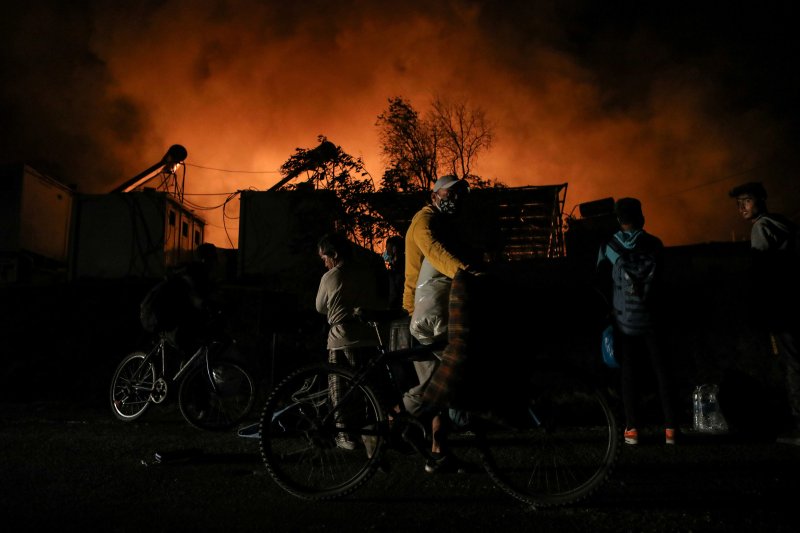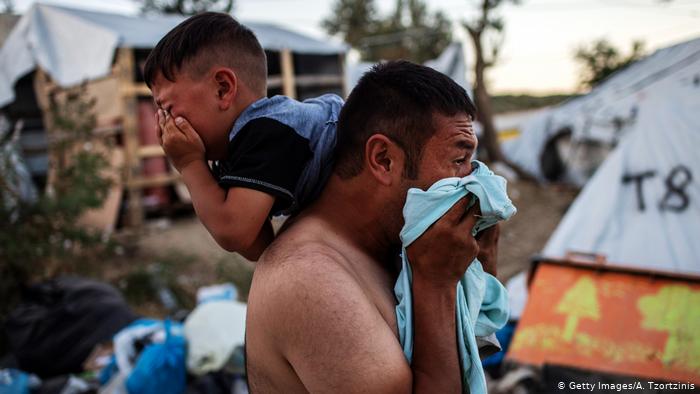By Maddy Constantine
Journalist Katy Fallon is on assignment on the Greek Island of Mytilene when she stumbles across a notebook lying in amongst the burnt remains of one of Europe’s most notorious refugee camps – “Moria”. Scribbled on the pages are sentences written by a refugee who appears to have been learning English. All we know is he is from Afghanistan and one day he would like to become a teacher. Katy tweets – “A reminder of the lives people were trying to build in here even amongst the chaos.”
In the weeks following the news that a devastating fire had destroyed the Moria camp, stories like Katy’s have emerged detailing the hardship faced by the refugees, and the residents of Mytilene . One side seemingly trapped on their quest for freedom, the other a country still woefully crippled by economic depression, with little to no support from the international community.
The Greek Government maintains the fire was started by irate refugees who refused to accept lockdown measures imposed upon them in response to an outbreak of COVID-19 in the camp. But to understand why refugees were pushed to breaking point, we need to look deeper into why tensions were on the rise between the Greek Government, refugees and the international community.

In 2016, a deal struck between the EU and Turkey meant that refugees in Mytilene were ordered to remain on the island until their visa applications were processed. Up until this point, Moria was highly dependent on humanitarian assistance and NGO activity to provide goods and services, but the change in policy resulted in most humanitarian organizations ceasing their operation.
Refugees have been forced to call Moria a makeshift home as the Greek government struggles to process asylum seeker applications at an all-time high. At the same time countries like Germany and the United Kingdom who once welcomed refugees with open arms, now face internal opposition to migration policy, with xenophobic undertones.
READ MORE: Moria refugee camp ordered to close and a proposed five new camps to open on Greek islands
READ MORE: Locals oppose new migrant camp construction on Lesvos claiming ‘Moria is over’
As a second generation Australian, whose own grandparents were refugees in Australia from Greece – I am deeply conflicted by the hardship faced by all groups involved in the situation. In this unending crisis which peaked in 2015 as conflicts in Syria, Afghanistan and Northern
Aid organizations have encouraged the efforts of some European governments such as France who have pledged to take in groups of migrant children following the fire, but continue to condemn the international community and the Greek Government.

The international community has scrutinized Greece for not doing more to protect the basic human rights of refugees who seek asylum on its shores. Prior to the fire there was significant overcrowding, hunger and a basic lack of access to healthcare in the camp. The Greek people and its government maintain they too are victims in this crisis, and cannot adequately care for refugees with no support from the international community. As a result, they remain at the frontline, and bear the brunt of criticism from the world.
It is widely reported that the Greek people in Mytilene were incredibly hospitable, helping to feed, clothe and shelter many migrant families. All this, despite the fact they were victims of their own financial crisis.
Moria has been burnt to the ground and it is evident that no winners emerge from the ashes.

It’s difficult to imagine that beyond the idyllic olive groves, in the country where my ancestors invented the concept of democracy, thousands of people suffer on their quest for freedom and peace. I care greatly for the residents of Mytilene, whose island is at the mercy of a geopolitical power play. We must get in touch with our relatives who may be experiencing this first-hand to offer whatever support they may need, and lobby our own leaders to try and improve the situation diplomatically in tandem with the European Union and the Greek Government.
It can be easy to lose hope at the complexity of the crisis that worsens everyday. We must remember however. that for many of us first and second generation Greek-Australians, if it were not for the bravery and suffering of our parents and grandparents who were refugees themselves, we would not enjoy the freedoms we do today. Let us also remember that for each criminal disguised as a refugee on the Greek Islands, there are tens of thousands of innocent people making a dangerous journey to freedom. I can guarantee that behind them, the people of Greece stand willing to open their homes and their hearts in the true spirit of Philotimo.

